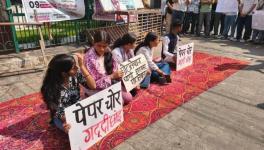Farmers’ Protest: No, Punjab Farmers Aren’t Rich; Over 40% in a Debt Trap
New Delhi: Camping at the outskirts of Delhi, farmers from Punjab and Haryana are at the forefront of the protest against three Farm Laws recently enacted by the Centre. They fear losing the safety net that the mandi system, regulated by the Agricultural Produce Market Committees (APMCs), provided them. Against the dominant narrative that the agitating farmers are rich and well-off, data suggests that 86% of peasants in Punjab are reeling under debt. Farmers in the state have a total debt of about Rs one lakh crore.
NewsClick met farmers, who are living under huge debt, at the Tikri border of the national capital where a peaceful indefinite sit-in has been ongoing for the past 20 days.
Nirmal Singh, an 80-year-old farmer from Bhatinda in Punjab, was struggling to shield himself from the cold outside in his tractor trolley. He has a small land holding of three acres.
“We are not here by choice, but under compulsion. If the government still does not relent, not only families, but cattle too will join this protest tomorrow. It is a struggle for our survival. We want a guarantee from the government that the food grain we produce is sold at MSP. Only then would we be able to clear the debt we have,” he said, mentioning that he has debt worth three lakh rupees.
“On an average, we spend around Rs 18,000/acre on the paddy crop. The MSP is somewhere between Rs 1,800 and Rs 1,900 per 100 kg. We always face the risk of extreme weather conditions. If weather conditions are favourable, we manage to ensure good production. We will be able to survive only if it is sold at MSP, we’ll be able to do something for the family and clear our debt,” he added.
“Assuring us that the MSP will remain without bringing it under the ambit of the law, is nothing more than a jumla. It is already there in other states, but except Punjab and Haryana, purchase of agricultural produce is not done according to it. We cannot afford to be left at the mercy of private players,” he added.
Jaswinder Singh, also a farmer from Bhatinda, has two acres of land. He has taken an additional six acres on lease from a local landlord, for which he has to pay Rs 70,000 per acre every year. He said that the breadwinners of many families have lost their lives to the burden of debt and disproportionate return.
“A large number of farmers in Punjab have died by suicide. But, unfortunately, these incidents don’t grab headlines. No one wants to end their life. Farmers are forced to take such an extreme step. We are victims of wrong policies by successive governments,” the debt-hit farmer, who has borrowed Rs nine lakh from a bank as well as from a private money-lender, was incensed.
“Instead of taking note of our plight, everyone has the notion that Punjab and its farmers are prosperous. Those who are well-off have not become rich only because of farming. They and their children went abroad and continue to work hard there,” he said.
Hitting out those who are being critical and trying to label the protest, Jaswinder said they are not out on the street by choice.
“We have been forced to hit the streets and block the roads so that we are heard. While you are able to dream, holed up inside a warm quilt, we are in our fields in this spine-chilling cold to ensure that you get bread. Now, we are also protesting for you. When the hoarding of agricultural products will trigger prices in the market, you will also feel the heat. Your salary grew many fold over the past 70 years; you change companies if you don’t get a hike, but we are still demanding MSP, which is minimum support, not maximum support,” he added.
He said he along with many others, he has no other source of income except through farming.
“The MSP we get appears to be a lot to others who are not familiar with our financial conditions. In addition to paying back the borrowed sum, we depend on that amount for everything. The reality is that we are unable to sleep because of the debt. Everything depends on the weather. Narrating our plight can seem like an endless saga, but no one still cares. Those who habituate cozy rooms and are under the privilege that cities provide can never understand the problems we face everyday,” he added.
Despite not wanting so, he said, their children are also involved in agricultural activities because of dearth of employment. “We can rid ourselves of stress only when our children are settled somewhere. It’s a myth that everyone in Punjab is rich. Yes, we have land and will not die of hunger. But we don’t have any other income,” he said.
Balor Singh, who is also from Bhatinda, owes a bank Rs five lakh and has another three lakh rupees worth of debt from a money-lender. He owns 2.5 acres of land.
“Since I am unable to pay back the loan only from farming, I am looking out for other sources of income like farming cattle and growing fodder for animals. But even those are not so profitable. Buffaloes are too costly these days. If the investment to produce one litre of milk is calculated, it would come to somewhere near Rs 28. But we sell at 25 rupees,” he said.
He said a majority of Punjab are small and marginal farmers who are heavily in debt. Very few have big land holdings. He too said he does not sleep in peace because of the debt and without the income to pay it back.
“Around 86% of farmers in Punjab are under debt. It is our family which gives us the hope to stay alive,” he said. According to a NABARD survey from 2018, 44% of Punjab’s households dependent on farming were in debt.
Bhatinda is in Punjab’s Malwa region, and comprises eight districts. Cotton is the main source of income for farmers in the region.
“The region has highest number of farmer suicides because of debt, but it is not reflected in the data compiled by the National Crime Records Bureau (NCRB). The children here inherit debt and take to stress after their fathers and end their lives,” Bharatiya Kisan Union (Ugrahan) president, Joginder Singh Ugrahan, told NewsClick.
According to data by the Punjab government there were 970 farmer suicides reported between April 2017 and August 2019. One farmer ends his life every 39 hours in the state.
Of the total production across the country, Punjab contributes five per cent of cotton, 10% of milk, 11% of paddy, 19% of wheat, 20% of honey and 48% of mushrooms. The state has just 1.58% of the total land in the country.
Debt Trap and Government Efforts
An estimate suggests around 20 lakh people in Punjab depend on farming for their livelihood; they are reeling under a debt burden of Rs 80,000 crore (as of 2018), which include loans taken from banks and money lenders.
In its election manifesto in the run-up to the 2017 Assembly Elections, the Congress had promised to waive off all farm loans. But, after securing a thumping majority against the ten-year-regime of the Shiromani Akali Dal (SAD) and Bharatiya Janata Party (BJP), the Captain Amarinder Singh-led government left the farmers disappointed. In June, the CM announced the waiver of crop loans up to Rs two lakh of all small and marginal farmers (up to five acres) and relief worth Rs two lakhs to the remaining marginal farmers, irrespective of their loan amount. Borrowings from private money lenders and arhtiyas (commission agents) were out of the debt waiver scheme.
The government said this waiver would cost the exchequer a sum of around Rs 10,000 crore. But a little over 50% of the Rs 10,000 crore has been paid so far. Debt worth Rs 5,123.43 crore for 5,61,567 farmers has been waived off till date in two phases beginning from January 2018.
Despite the notification of the abolition of ‘kurki’ by deleting Section 67-A of the Punjab Cooperative Societies Act, the attachment of farmers’ land in case of loan defaults is still an occurrence. It has been happening because private banks and private money lenders are not covered in the Act. A large number of farmers take loans from commercial banks and money lenders. When farmers default on payment, these lenders approach the courts and obtain decrees for attaching their land.
Criticising the state government’s loan waiver policy, Ugrahan said not even five per cent of the total debt of farmers in the state has been waived off. “Of the 65% marginal and small farmers in the state, only 33% have been covered so far. On an average, debt to the tune of Rs 80,000 per farmer has been waived off. This amount is nothing. A farmer here spends this sum on one acre of land to get two crops a year,” he rued.
Before the election, he said, the Congress collected data by asking farmers to fill up a form furnishing details of the debt they had from various sources. “In their manifesto, the party promised a debt waiver to every farmer. But after coming to power, the party failed to walk the talk. In fact it cheated the farming community,” he fumed. He said the government should have given at least a one-time complete debt waiver to all farmers.
Get the latest reports & analysis with people's perspective on Protests, movements & deep analytical videos, discussions of the current affairs in your Telegram app. Subscribe to NewsClick's Telegram channel & get Real-Time updates on stories, as they get published on our website.
























